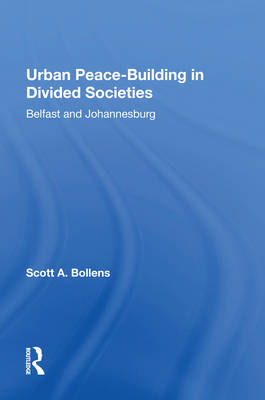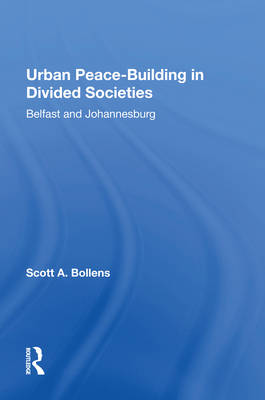
- Afhalen na 1 uur in een winkel met voorraad
- Gratis thuislevering in België vanaf € 30
- Ruim aanbod met 7 miljoen producten
- Afhalen na 1 uur in een winkel met voorraad
- Gratis thuislevering in België vanaf € 30
- Ruim aanbod met 7 miljoen producten
Zoeken
€ 83,95
+ 167 punten
Uitvoering
Omschrijving
Urban Peacebuilding in Divided Societies explores the effects of urban policy and planning in the management of ethnic conflict in strife-torn societies, focusing on the cases of Belfast and Johannesburg. It combines perspectives from urban geography, political science, social psychology, and urban planning to study the relationship between ethnic ideologies and the urban strategies that affect ethnic territoriality in the form of urban land use, housing, economic development, services, and citizen involvement. The book contrasts Belfast, embedded within an uncertain shift from conflict to political settlement, with Johannesburg, engaged in post-resolution reconciliation, to analyze, along different points of societal transition, the contributions of urban policymaking to peacemaking and peacebuilding. It describes the differing rolesobstructive or facilitativethat contested cities can play amidst broader peacemaking efforts, consistent with Bollens contention that there are lessons in urban peacebuilding for constructing mutually tolerable living environments at the regional and national levels. Effectively, cities (and urban policies) are the locus for operationalizing national ideologies of ethnic coexistence. } Urban Peacebuilding in Divided Societies explores the effects of urban policy and planning in the management of ethnic conflict in strife-torn societies, focusing on the cases of Belfast and Johannesburg. It combines perspectives from urban geography, political science, social psychology, and urban planning to study the relationship between ethnic ideologies and the urban strategies that affect ethnic territoriality in the form of urban land use, housing, economic development, services, and citizen involvement. The book contrasts Belfast, embedded within an uncertain shift from conflict to political settlement, with Johannesburg, engaged in post-resolution reconciliation, to analyze, along different points of societal transition, the contributions of urban policymaking to peacemaking and peacebuilding. It describes the differing rolesobstructive or facilitativethat contested cities can play amidst broader peacemaking efforts, consistent with Bollens contention that there are lessons in urban peacebuilding for constructing mutually tolerable living environments at the regional and national levels. Effectively, cities (and urban policies) are the locus for operationalizing national ideologies of ethnic coexistence.}
Specificaties
Betrokkenen
- Auteur(s):
- Uitgeverij:
Inhoud
- Aantal bladzijden:
- 356
- Taal:
- Engels
Eigenschappen
- Productcode (EAN):
- 9780367217211
- Verschijningsdatum:
- 30/06/2022
- Uitvoering:
- Paperback
- Formaat:
- Trade paperback (VS)
- Afmetingen:
- 152 mm x 229 mm
- Gewicht:
- 476 g

Alleen bij Standaard Boekhandel
+ 167 punten op je klantenkaart van Standaard Boekhandel
Beoordelingen
We publiceren alleen reviews die voldoen aan de voorwaarden voor reviews. Bekijk onze voorwaarden voor reviews.











